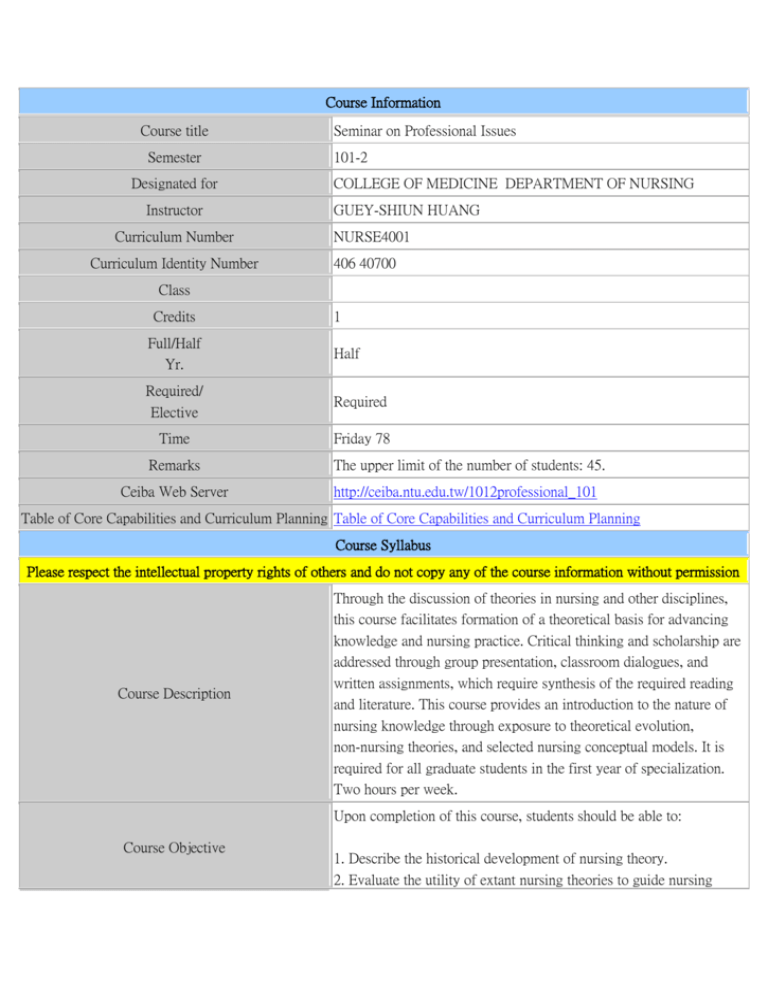
Course Information
Course title
Semester
Designated for
Instructor
Curriculum Number
Curriculum Identity Number
Seminar on Professional Issues
101-2
COLLEGE OF MEDICINE DEPARTMENT OF NURSING
GUEY-SHIUN HUANG
NURSE4001
406 40700
Class
Credits
1
Full/Half
Yr.
Half
Required/
Elective
Required
Time
Friday 78
Remarks
The upper limit of the number of students: 45.
Ceiba Web Server
http://ceiba.ntu.edu.tw/1012professional_101
Table of Core Capabilities and Curriculum Planning Table of Core Capabilities and Curriculum Planning
Course Syllabus
Please respect the intellectual property rights of others and do not copy any of the course information without permission
Course Description
Through the discussion of theories in nursing and other disciplines,
this course facilitates formation of a theoretical basis for advancing
knowledge and nursing practice. Critical thinking and scholarship are
addressed through group presentation, classroom dialogues, and
written assignments, which require synthesis of the required reading
and literature. This course provides an introduction to the nature of
nursing knowledge through exposure to theoretical evolution,
non-nursing theories, and selected nursing conceptual models. It is
required for all graduate students in the first year of specialization.
Two hours per week.
Upon completion of this course, students should be able to:
Course Objective
1. Describe the historical development of nursing theory.
2. Evaluate the utility of extant nursing theories to guide nursing
practice.
3. Explore various paradigms that underlie nursing knowledge.
4. Relate ways of thinking about nursing knowledge to grand,
middle-range, and situation specific nursing theories.
5. Analyze nursing phenomena from a variety of theoretical
perspectives.
6. Apply an original or adapted theory to the selected clinical
problem.
7. Examine the relationships among theory, practice, and research.
Lecture, classroom discussion, group presentation, dialogues, and
written assignments.
Each group of students should choose one interested topic scheduled
between 10/03 & 11/28, to review and synthesize the existing
literature and to give a presentation to fellow classmates. Prior to the
presentation, students are expected to discuss the content with faculty.
Sufficient discussion time needs to be allocated during the two-hour
lecture time.
Course Requirement
The written assignment invites students to synthesize what they have
learned throughout the course about theoretical basis of nursing
practice. Each student is required to select one theory-based
publication, including but not limited to case studies, educational
programs or administrative projects and to evaluate/criticize the
strength and weakness of this selected publication in utilizing the
chosen theory. The final paper, which is due on January 07, 2013,
should be written to delineate this scholarly evaluation.
In the last three weeks of the course, students will be grouped into six
and one presentation should be made as a group effort.
Office Hours
References
Designated reading
Alligood M. R., & Tomey, A. M. (2010). Nursing Theory: Utilization
& Application (4th Ed.). St. Louis: Mosby, Inc.
Parker, M. (2010). Nursing Theories and Nursing Practice (3rd Ed.).
Philadelphia: F.A. Davis Company.
Fawcett, J. (2012). Contemporary Nursing Knowledge: Analysis and
Evaluation of Nursing Models and Theories (3rd Ed.). Philadelphia:
F.A. Davis Company.
Meleis, A. I. (2011). Theoretical Nursing: Development and Progress
(5th Ed.). Philadelphia : Lippincott Williams & Wilkins.
Reed, P.G., Shearer, N.C., & Nicoll, L. H. (2011). Perspectives on
Nursing Theory (6th Ed.). Philadelphia: Lippincott Williams &
Wilkins.
Tomey, A. M., & Alligood, M. R. (2009). Nursing Theorists and
Their Work (7th Ed.). St. Louis: Mosby, Inc.
Walker, L. O., & Avant, K. C. (2010). Strategies for Theory
Construction in Nursing (5th Ed.). Upper Saddle River, NJ:
Pearson/Prentice Hall.
No.
Grading
Item
%
1. Final Exam
40%
2. Homework
20%
3. Midterm Exam
40%
Progress
Week
Date
Topic
Week 1
Introduction/ genome and genome project
Week 2
The Human Genome Project
Week 3
Genome Projects: Organization and Objectives
Week 4
Genome Sequencing
Week 5
DNA sequence technologies
Week 6
Genome Annotation
Week 7
SNPs and Variation
Week 8
Gene Expression and Transcriptome
Week 9
Functional Genomics
Week 10
Epigenomics
Week 11
Evolution and comparative genomics
Explanations for the conditions






